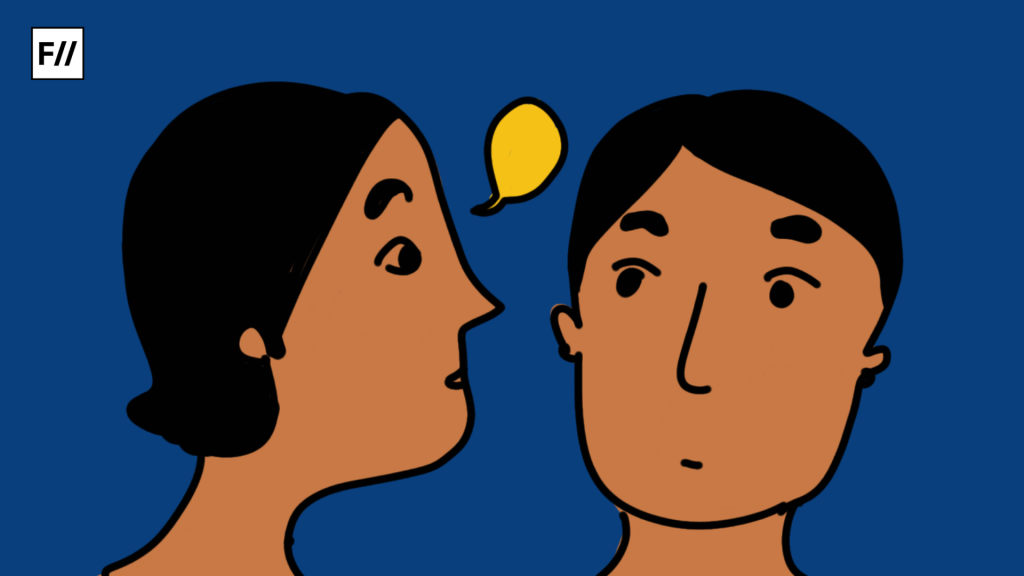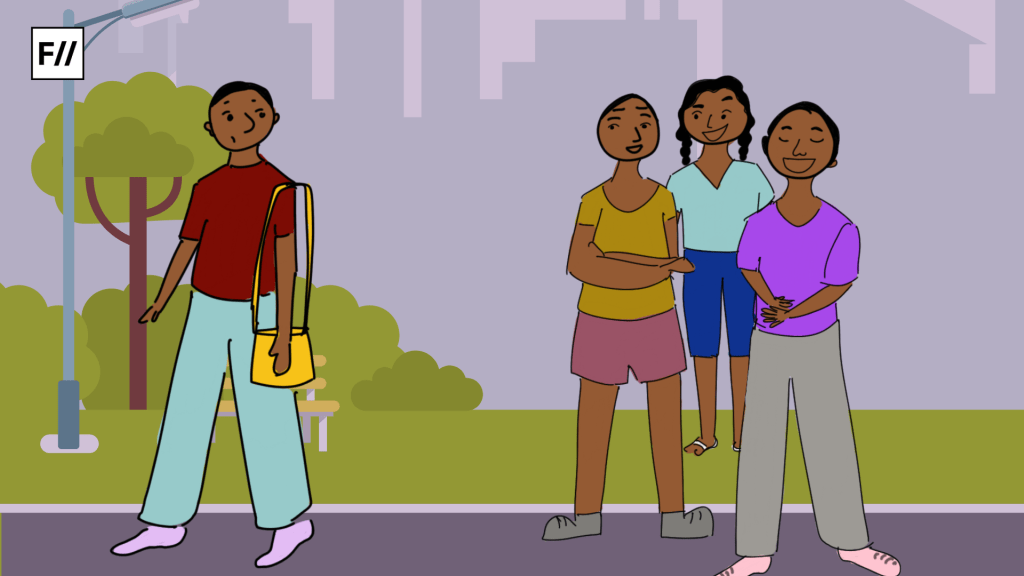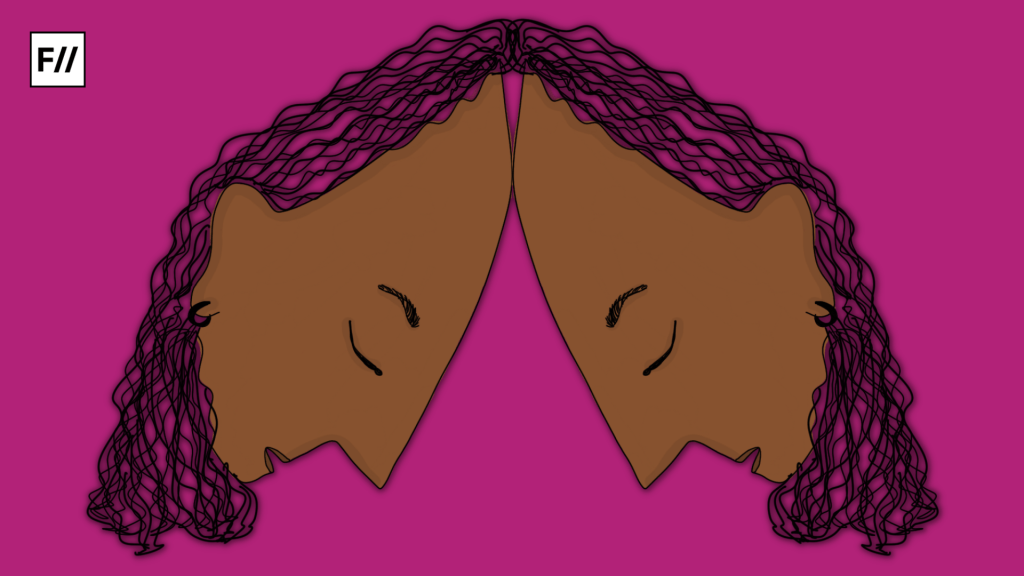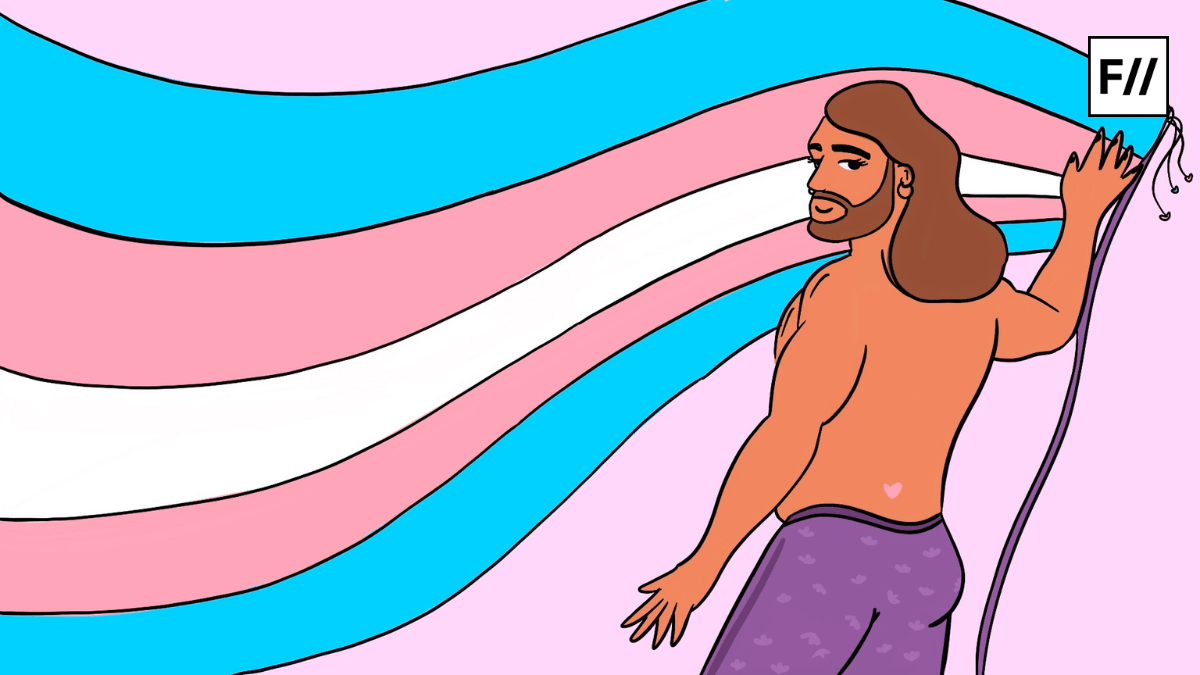‘Trap,’ is a common slur that is thrown at transgender individuals across the globe to pin them down with the alleged allegation that they are some sort of cult practitioners tricking ‘innocent,’ non-trans minds into desiring them and being fooled as a consequence. The closest Hindi correlate to ‘trap,’ is ‘dhokha‘- it is a rampant and recurrent shutdown/slight that is used for online trolling of transgender individuals on Indian social media.
‘Dhokha,’ invalidates the realness of transgender experience and constructs it as ‘fake,’ or ‘made up.’ It is almost issued as a warning to unsuspecting admirers so that they too become cautious of what they are signing up for by liking such content.
However, ‘dhokha,’ does not restrict itself to its online ugly head, but continues to shape interactions between trans and non-trans individuals in flesh and bones. It has also sadly even infiltrated trans-inclusive spaces, setting trans people against each other based on who is less of a ‘dhokha,’ to the mainstream. This is further decided by whether they can afford gender-affirmative treatments and lifestyle practices.
If one cannot be clocked as ‘trans,’ then that leads to their exclusion within transgender spaces. On the other hand, they have to tackle the contempt of the mainstream for pulling off a ‘dhokha‘ with perfection. So, it is a double whammy with little resolution. The burden of ‘dhokha,’ therefore falls unevenly on transgender individuals who cannot be immediately hunted out with prevailing stereotypes.
Yes, offence for just existing
Broadly speaking, the idea of ‘dhokha,’/deception/trickery makes the trans person’s existence a penal and offensive act in itself by delegitimising its authenticity/truth. The notion probably has its roots in transness breaking the watertight boundaries between how one presents themselves in social/public space and what genitalia they are assumed to have.

While the trans person is charged with ‘dhokha,’ it seems to be the self-imposed righteousness of non-trans persons to expose the ‘dhokha,’- this dynamic spills over into trans lives in pertinent ways, affecting all spheres of their existence. This comes very close to a witch-hunting of transgender individuals for tricking/deceiving the cishet mainstream, leaving them tired of battling out the ‘dhokha,’ that trans-prejudiced/ignorant minds narrate about their existence to the larger society.
If there had been trials for witches in medieval Europe, the hate crimes around the world (that disproportionately target transgender women of colour more than other trans individuals), are steadily rising to attest to a similar wave of hatred directed at transgender identities and expressions.
What did the poor dress do
Not so long ago, there were anti-cross-dressing laws that legitimised state censorship over such a fundamental act of self-expression such as dressing and appended penalties to the same when it transgressed traditional expectations of present society.

By putting the ‘dress,’ at the heart of state policing, transgender individuals were reduced to their dresses/outward gender expression/presentation, the state seldom going beyond to connect with their personhoods or gender identities. Therefore, their existence became synonymous with trickery through ‘dress.’ But what makes the dress so sacrosanct and communicative of one’s gender identity?
This is perhaps again rooted in a dominant cultural system of practice where dressing is essentially thought to communicate genital status. As transgender individuals transgress these boundaries and reveal their porousness, they are perceived as a threat to dominant cultural norms and there are sincere efforts to contain them to maintain the status quo.
Questions also arise regarding the applicability of ‘cross-dressing,’ as a legitimate term for gender presentation in the case of transgender individuals. It is callously thrown around in public/bio-medical discourse for transgender people who dress affirmatively to represent their gender identity. However, these individuals are merely authentically dressing themselves to reflect their true selves and not crossing over. There are of course trans and gender non-conforming folks who self-identify as cross-dressers. There are also drag performers who ‘cross-dress,’ for entertainment and stage performances.
However, using this term uncritically warrants caution as it carries within it the obnoxious insinuation that transgender people are ‘really,’ ‘men in women’s clothes,’ ‘women in men’s clothes,’ – a thorough disregard of their gendered selfhoods and identity development. Taking the debate a bit further, there is a need to question now with increasing queer representation and moving beyond binaries, whether ‘dress,‘ can at all be gendered?
Prejudice packaged in layers and witch-hunting of trans folks
The idea of ‘dhokha,‘ feeds into the very texture of the word ‘cross-dressing,’ so that its invocation is supposed to elicit suspicion. This is reflected in online trolls leaving comments like ‘salwar mein talwaar,‘ (referring to the possibility of male genitalia on female attire) as a response to content posted by transgender women to re-iterate their genital status and hunt them down as ‘dhokha.’ Ironically, the trolls themselves are not acutely aware of the genital status in many cases; they see it as an inalterable reality by birth when that is not the case.
The social disgust, shame and prejudice multiplies particularly if the transgender person in question is assigned male-at-birth. The increased violence towards male-assigned-at-birth persons who bend gendered expectations of society is not surprising given how maleness is a cherished goal in predominantly patriarchal and misogynistic societies around the globe. These laws even go to the length of re-interpreting the freedom of alternative self-expression as a social malady/sex offence, seeking to banish it from public space, ultimately clamping down on any non-conformity in gender expression. No wonder, ‘anti cross-dressing,’ laws, wherever they exist, continue to be a common trope for police brutality and harassment that has far-reaching consequences for the arrested.
Tricky intimacies
The idea of trickery/deception also feeds into the interpersonal relationships of transgender individuals. The mere disclosure of trans identity becomes a battleground of conflicting thoughts and motivations. Misgendering by intimate partners often serves as a rude reminder that transgender persons are not perceived as they are.
Incidental disclosures may also spiral into shame and mud-slinging for the concerned transgender person with consequences as drastic as termination of the relationship. Disclosure therefore precisely becomes a ‘doomed if you do, damned if you don’t‘ kind of situation, a double-edged sword that constantly nags away at a trans person’s consciousness.

In interpersonal intimacies with cisgender heterosexual individuals, transgender individuals also navigate complex challenges of their partner’s sexuality being put to a social litmus test. This scrutiny is particularly intense if the partner identifies as straight. Given the social brand value of ‘straightness,’ the protectors of its sanctity are too many. Even the Internet goes wild in trying to figure out the sexuality of a cis man who gets attracted to a trans-woman especially if he considers himself as straight.
Some trans fetishists exclusively fish out trans individuals for sexual/romantic intimacy, dehumanising them. The ‘dhokha‘ becomes their fetish, their object of desire. Many trans folks have often been privy to comments like ‘People cannot understand when they see you‘, and ‘You are so natural.’
These comments reinforce that they are an imposter putting up a show to deceive/trick the mainstream into having sex with them. Moreover, they are also being evaluated on how well they can deceive/trick. Such narratives are rampant in informal banters with trans friends on their intimacies with non-trans individuals.
Down with the deception debate, down with dhokha
The deception debate also comes into the forefront regarding washroom access, access to children’s spaces and even any sex-segregated spaces that exist in security checks at shopping complexes, airports and the list may go on. This puts continuous pressure on transgender individuals to legitimise their identities which is counteracted by pushback from the mainstream society to hunt out their ‘dhokha.’ Such tensions have unfortunately led to violent murders and loss of lives.
As rainbows and butterflies descend on our Pride Month celebrations, may we not forget that trans people were at the forefront of the queer rights liberation movement. The onus therefore falls on the larger LGBTQIAH+ community to not give them ‘dhokha,’ and advocate for the truth and authenticity of their lived experiences and struggles.
About the author(s)
Aritra Chatterjee (she/her) is a clinical psychologist who actively advocates against discrimination against the LGBTQIA+ community while being a member of the community herself.





